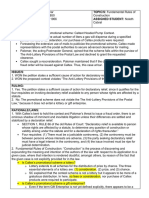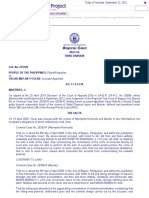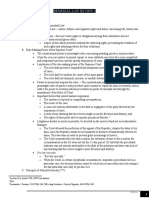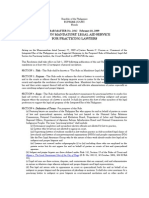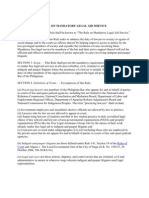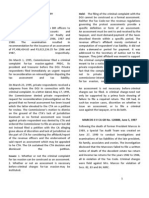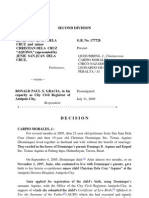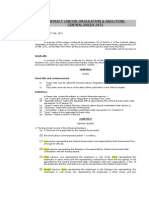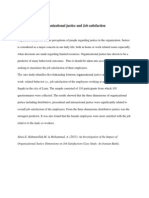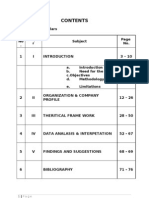Mandatory Legal Aid Service
Mandatory Legal Aid Service
Uploaded by
Jay RibsCopyright:
Available Formats
Mandatory Legal Aid Service
Mandatory Legal Aid Service
Uploaded by
Jay RibsOriginal Description:
Copyright
Available Formats
Share this document
Did you find this document useful?
Is this content inappropriate?
Copyright:
Available Formats
Mandatory Legal Aid Service
Mandatory Legal Aid Service
Uploaded by
Jay RibsCopyright:
Available Formats
BAR MATTER No.
2012 February 10, 2009 RULE ON MANDATORY LEGAL AID SERVICE FOR PRACTICING LAWYERS Acting on the Memorandum dated January 27, 2009 of Justice Renato C. Corona re: Comment of the Integrated Bar of the Philippines on our Suggested Revisions to the Proposed Rule of Mandatory Legal Aid Service for Practicing Lawyers, the Court Resolved to APPROVE the same. This Resolution shall take effect on July 1, 2009 following publication of the said Rule and its implementing regulations in at least two (2) newpapers of general circulation. SECTION 1. Title. - This Rule shall be known as The Rule on Mandatory Legal Aid Service. SECTION 2. Purpose. - This Rule seeks to enhance the duty of lawyers to society as agents of social change and to the courts as officers thereof by helping improve access to justice by the less privileged members of society and expedite the resolution of cases involving them. Mandatory free legal service by members of the bar and their active support thereof will aid the efficient and effective administration of justice especially in cases involving indigent and pauper litigants. SECTION 3. Scope. - This Rule shall govern the mandatory requirement for practicing lawyers to render free legal aid services in all cases (whether, civil, criminal or administrative) involving indigent and pauper litigants where the assistance of a lawyer is needed. It shall also govern the duty of other members of the legal profession to support the legal aid program of the Integrated Bar of the Philippines. SECTION 4. Definition of Terms. - For purposes of this Rule: (a) Practicing lawyers are members of the Philippine Bar who appear for and in behalf of parties in courts of law and quasi-judicial agencies, including but not limited to the National Labor Relations Commission, National Conciliation and Mediation Board, Department of Labor and Employment Regional Offices, Department of Agrarian Reform Adjudication Board and National Commission for Indigenous Peoples. The term practicing lawyers shall exclude: (i) Government employees and incumbent elective officials not allowed by law to practice; (ii) Lawyers who by law are not allowed to appear in court; (iii) Supervising lawyers of students enrolled in law student practice in duly accredited legal clinics of law schools and lawyers of non-governmental organizations (NGOs) and peoples organizations (POs) like the Free Legal Assistance Group who by the nature of their work already render free legal aid to indigent and pauper litigants and (iv) Lawyers not covered under subparagraphs (i) to (iii) including those who are employed in the private sector but do not appear for and in behalf of parties in courts of law and quasi-judicial agencies.
(b) Indigent and pauper litigants are those defined under Rule 141, Section 19 of the Rules of Court and Algura v. The Local Government Unit of the City of Naga (G.R. No.150135, 30 October 2006, 506 SCRA 81); (c) Legal aid cases are those actions, disputes, and controversies that are criminal, civil and administrative in nature in whatever stage wherein indigent and pauper litigants need legal representation; (d) Free legal aid services refer to appearance in court or quasi-judicial body for and in behalf of an indigent or pauper litigant and the preparation of pleadings or motions. It shall also cover assistance by a practicing lawyer to indigent or poor litigants in court-annexed mediation and in other modes of alternative dispute resolution (ADR). Services rendered when a practicing lawyer is appointed counsel de oficio shall also be considered as free legal aid services and credited as compliance under this Rule; (e) Integrated Bar of the Philippines (IBP) is the official national organization of lawyers in the country; (f) National Committee on Legal Aid (NCLA) is the committee of the IBP which is specifically tasked with handling legal aid cases; (g) Committee on Bar Discipline (CBD) is the committee of the IBP which is specifically tasked with disciplining members of the Bar; (h) IBP Chapters are those chapters of the Integrated Bar of the Philippines located in the different geographical areas of the country as defined in Rule 139-A and (i) Clerk of Court is the Clerk of Court of the court where the practicing lawyer rendered free legal aid services. In the case of quasi-judicial bodies, it refers to an officer holding an equivalent or similar position. The term shall also include an officer holding a similar position in agencies exercising quasi-judicial functions, or a responsible officer of an accredited PO or NGO, or an accredited mediator who conducted the court-annexed mediation proceeding. SECTION 5. Requirements. (a) Every practicing lawyer is required to render a minimum of sixty (60) hours of free legal aid services to indigent litigants in a year. Said 60 hours shall be spread within a period of twelve (12) months, with a minimum of five (5) hours of free legal aid services each month. However, where it is necessary for the practicing lawyer to render legal aid service for more than five (5) hours in one month, the excess hours may be credited to the said lawyer for the succeeding periods. For this purpose, a practicing lawyer shall coordinate with the Clerk of Court for cases where he may render free legal aid service. He may also coordinate with the IBP Legal Aid Chairperson of the IBP Chapter to inquire about cases where he may render free legal aid service. In this connection, the IBP Legal Aid Chairperson of the IBP Chapter shall regularly and actively coordinate with the Clerk of Court. The practicing lawyer shall report compliance with the requirement within ten (10) days of the last month of each quarter of the year. (b) A practicing lawyer shall be required to secure and obtain a certificate from the Clerk of Court attesting to the number of hours spent rendering free legal aid services in a case. The certificate shall contain the following information:
(i) The case or cases where the legal aid service was rendered, the party or parties in the said case(s) for whom the service was rendered, the docket number of the said case(s) and the date(s) the service was rendered. (ii) The number of hours actually spent attending a hearing or conducting trial on a particular case in the court or quasi-judicial body. (iii) The number of hours actually spent attending mediation, conciliation or any other mode of ADR on a particular case. (iv) A motion (except a motion for extension of time to file a pleading or for postponement of hearing or conference) or pleading filed on a particular case shall be considered as one (1) hour of service. The Clerk of Court shall issue the certificate in triplicate, one (1) copy to be retained by the practicing lawyer, one (1) copy to be retained by the Clerk of Court and one (1) copy to be attached to the lawyers compliance report. (c) Said compliance report shall be submitted to the Legal Aid Chairperson of the IBP Chapter within the courts jurisdiction. The Legal Aid Chairperson shall then be tasked with immediately verifying the contents of the certificate with the issuing Clerk of Court by comparing the copy of the certificate attached to the compliance report with the copy retained by the Clerk of Court. (d) The IBP Chapter shall, after verification, issue a compliance certificate to the concerned lawyer. The IBP Chapter shall also submit the compliance reports to the IBP NCLA for recording and documentation. The submission shall be made within forty-five (45) days after the mandatory submission of compliance reports by the practicing lawyers. (e) Practicing lawyers shall indicate in all pleadings filed before the courts or quasi-judicial bodies the number and date of issue of their certificate of compliance for the immediately preceding compliance period. Failure to disclose the required information would cause the dismissal of the case and the expunction of the pleadings from the records. (f) Before the end of a particular year, lawyers covered by the category under Section 4(a)(i) and (ii), shall fill up a form prepared by the NCLA which states that, during that year, they are employed with the government or incumbent elective officials not allowed by law to practice or lawyers who by law are not allowed to appear in court. The form shall be sworn to and submitted to the IBP Chapter or IBP National Office together with the payment of an annual contribution of Two Thousand Pesos (P2,000). Said contribution shall accrue to a special fund of the IBP for the support of its legal aid program. (g) Before the end of a particular year, lawyers covered by the category under Section 4(a)(iii) shall secure a certification from the director of the legal clinic or of the concerned NGO or PO to the effect that, during that year, they have served as supervising lawyers in a legal clinic or actively participated in the NGO or PO free legal aid activities. The certification shall be submitted to the IBP Chapter or IBP National Office. (h) Before the end of a particular year, lawyers covered by the category under Section 4(a)(iv) shall fill up a form prepared by the NCLA which states that, during that year, they are neither practicing lawyers nor covered by Section (4)(a)(i) to (iii). The form shall be sworn to and submitted to the IBP Chapter or IBP National Office together with the payment of an annual contribution of Four Thousand Pesos (P4,000) by way of support for the efforts of practicing lawyers who render mandatory free legal aid services. Said contribution shall accrue to a special fund of the IBP for the support of its legal aid program.
(i) Failure to pay the annual contribution shall subject the lawyer to a penalty of Two Thousand Pesos (P2,000) for that year which amount shall also accrue to the special fund for the legal aid program of the IBP. SECTION 6. NCLA. (a) The NCLA shall coordinate with the various legal aid committees of the IBP local chapters for the proper handling and accounting of legal aid cases which practicing lawyers can represent. (b) The NCLA shall monitor the activities of the Chapter of the Legal Aid Office with respect to the coordination with Clerks of Court on legal aid cases and the collation of certificates submitted by practicing lawyers. (c) The NCLA shall act as the national repository of records in compliance with this Rule. (d) The NCLA shall prepare the following forms: certificate to be issued by the Clerk of Court and forms mentioned in Section 5(e) and (g). (e) The NCLA shall hold in trust, manage and utilize the contributions and penalties that will be paid by lawyers pursuant to this Rule to effectively carry out the provisions of this Rule. For this purpose, it shall annually submit an accounting to the IBP Board of Governors. The accounting shall be included by the IBP in its report to the Supreme Court in connection with its request for the release of the subsidy for its legal aid program. SECTION 7. Penalties. (a) At the end of every calendar year, any practicing lawyer who fails to meet the minimum prescribed 60 hours of legal aid service each year shall be required by the IBP, through the NCLA, to explain why he was unable to render the minimum prescribed number of hours. If no explanation has been given or if the NCLA finds the explanation unsatisfactory, the NCLA shall make a report and recommendation to the IBP Board of Governors that the erring lawyer be declared a member of the IBP who is not in good standing. Upon approval of the NCLA recommendation, the IBP Board of Governors shall declare the erring lawyer as a member not in good standing. Notice thereof shall be furnished the erring lawyer and the IBP Chapter which submitted the lawyer compliance report or the IBP Chapter where the lawyer is registered, in case he did not submit a compliance report. The notice to the lawyer shall include a directive to pay Four Thousand Pesos (P4,000) penalty which shall accrue to the special fund for the legal aid program of the IBP. (b) The not in good standing declaration shall be effective for a period of three (3) months from the receipt of the erring lawyer of the notice from the IBP Board of Governors. During the said period, the lawyer cannot appear in court or any quasi-judicial body as counsel. Provided, however, that the not in good standing status shall subsist even after the lapse of the three-month period until and unless the penalty shall have been paid. (c) Any lawyer who fails to comply with his duties under this Rule for at least three (3) consecutive years shall be the subject of disciplinary proceedings to be instituted motu proprio by the CBD. The said proceedings shall afford the erring lawyer due process in accordance with the rules of the CBD and Rule 139-B of the Rules of Court. If found administratively liable, the penalty of suspension in the practice of law for one (1) year shall be imposed upon him.
(d) Any lawyer who falsifies a certificate or any form required to be submitted under this Rule or any contents thereof shall be administratively charged with falsification and dishonesty and shall be subject to disciplinary action by the CBD. This is without prejudice to the filing of criminal charges against the lawyer. (e) The falsification of a certificate or any contents thereof by any Clerk of Court or by any Chairperson of the Legal Aid Committee of the IBP local chapter where the case is pending or by the Director of a legal clinic or responsible officer of an NGO or PO shall be a ground for an administrative case against the said Clerk of Court or Chairperson. This is without prejudice to the filing of the criminal and administrative charges against the malfeasor. SECTION 8. Credit for Mandatory Continuing Legal Education (MCLE). - A lawyer who renders mandatory legal aid service for the required number of hours in a year for the three year-period covered by a compliance period under the Rules on MCLE shall be credited the following: two (2) credit units for legal ethics, two (2) credit units for trial and pretrial skills, two (2) credit units for alternative dispute resolution, four (4) credit units for legal writing and oral advocacy, four (4) credit units for substantive and procedural laws and jurisprudence and six (6) credit units for such subjects as may be prescribed by the MCLE Committee under Section 2(9), Rule 2 of the Rules on MCLE. A lawyer who renders mandatory legal aid service for the required number of hours in a year for at least two consecutive years within the three year-period covered by a compliance period under the Rules on MCLE shall be credited the following: one (1) credit unit for legal ethics, one (1) credit unit for trial and pretrial skills, one (1) credit unit for alternative dispute resolution, two (2) credit units for legal writing and oral advocacy, two (2) credit units for substantive and procedural laws and jurisprudence and three (3) credit units for such subjects as may be prescribed by the MCLE Committee under Section 2(g), Rule 2 of the Rules on MCLE. SECTION 9. Implementing Rules. - The IBP, through the NCLA, is hereby given authority to recommend implementing regulations in determining who are practicing lawyers, what constitute legal aid cases and what administrative procedures and financial safeguards which may be necessary and proper in the implementation of this rule may be prescribed. It shall coordinate with the various legal chapters in the crafting of the proposed implementing regulations and, upon approval by the IBP Board of Governors, the said implementing regulations shall be transmitted to the Supreme Court for final approval. SECTION 10. Effectivity. - This Rule and its implementing rules shall take effect on July 1,2009 after they have been published in two (2) newspapers of general circulation.
You might also like
- Reference Letter For Employment AustraliaDocument8 pagesReference Letter For Employment Australiabcqy21t7100% (2)
- Motion To Amend Name of AccusedDocument2 pagesMotion To Amend Name of AccusedJay Ribs50% (2)
- CIR Vs MICHEL LHUILLIER PAWNSHOP DigestDocument2 pagesCIR Vs MICHEL LHUILLIER PAWNSHOP DigestJay Ribs100% (6)
- Dela Salle University Vs Dela SALLE UNIVERSITY EMPLOYEES ASSOCIATION DIGESTDocument1 pageDela Salle University Vs Dela SALLE UNIVERSITY EMPLOYEES ASSOCIATION DIGESTJay RibsNo ratings yet
- Office Administration SBADocument18 pagesOffice Administration SBALisa B Arnold67% (3)
- Employee Performance Appraisal CommentsDocument6 pagesEmployee Performance Appraisal CommentsMichael BobNo ratings yet
- TermDocument18 pagesTermhannahanasan02No ratings yet
- Canon 1-3 EditedDocument25 pagesCanon 1-3 Editedkristian datinguinooNo ratings yet
- CRIMLAW Intro Chapter IDocument32 pagesCRIMLAW Intro Chapter IMONTILLA Licel100% (1)
- PFR QUIZ 1 ReviewerDocument4 pagesPFR QUIZ 1 ReviewerRejoyceNo ratings yet
- Manuscript Crim LawDocument7 pagesManuscript Crim LawTim BillonesNo ratings yet
- Statcon 228Document5 pagesStatcon 228Rish DiasantaNo ratings yet
- 2010 Bar Review Notes in Political Law by Atty. Dela CruzDocument258 pages2010 Bar Review Notes in Political Law by Atty. Dela CruzsjlaNo ratings yet
- Constitutional Law CasesDocument3 pagesConstitutional Law CasesApple Gee Libo-onNo ratings yet
- Rochi vs. Department of EnergyDocument32 pagesRochi vs. Department of EnergyRozaiineNo ratings yet
- AMADO ALVARADO GARCIA v. PEOPLE OF THE PHILIPPINES, G.R. NO. 171951, August 28, 2009Document2 pagesAMADO ALVARADO GARCIA v. PEOPLE OF THE PHILIPPINES, G.R. NO. 171951, August 28, 2009hudor tunnelNo ratings yet
- Executive Agreements TREATIES, ConstiutionalityDocument1 pageExecutive Agreements TREATIES, ConstiutionalityTony OgbinarNo ratings yet
- Oblicon-Assigned Cases Under ContractsDocument3 pagesOblicon-Assigned Cases Under ContractsSuiNo ratings yet
- 12 Vargas Vs KilclineDocument4 pages12 Vargas Vs KilclinemilotNo ratings yet
- Liang Vs People (232 SCRA 652)Document2 pagesLiang Vs People (232 SCRA 652)dan cosmiNo ratings yet
- 15 Spouses Montecillo v. GatchalianDocument5 pages15 Spouses Montecillo v. Gatchalianmei atienzaNo ratings yet
- Statutory Construction CasesDocument54 pagesStatutory Construction CasesChristine DavidNo ratings yet
- Compiled Poli DigestDocument800 pagesCompiled Poli Digestredbutterfly_766100% (2)
- DLSU CrimDocument21 pagesDLSU CrimAngela TorresNo ratings yet
- Estrada v. Sandiganbayan 369 SCRA 394 (2001)Document24 pagesEstrada v. Sandiganbayan 369 SCRA 394 (2001)FranzMordenoNo ratings yet
- The Law Curriculum - Ateneo Law School PDFDocument2 pagesThe Law Curriculum - Ateneo Law School PDFFerrer BenedickNo ratings yet
- Lozano V NogralesDocument2 pagesLozano V NogralesKelly RoxasNo ratings yet
- Consolidation 1Document11 pagesConsolidation 1NolethNo ratings yet
- Management Process: 1. Planning and Decision Making - Determining Courses of ActionDocument6 pagesManagement Process: 1. Planning and Decision Making - Determining Courses of ActionSheila Mae AramanNo ratings yet
- Canons 1 To 20Document24 pagesCanons 1 To 20chikayNo ratings yet
- Criminal Law 1Document7 pagesCriminal Law 1Maria NgNo ratings yet
- Consti Cases Territory National Economy and PatrimonyDocument129 pagesConsti Cases Territory National Economy and PatrimonyJean Ben Go SingsonNo ratings yet
- Yapyuco Vs SandiganbayanDocument40 pagesYapyuco Vs SandiganbayanDura LexNo ratings yet
- SC Bar Matter 1153Document2 pagesSC Bar Matter 1153theamorerosaNo ratings yet
- G.R. No. 215720Document9 pagesG.R. No. 215720Myza AgyaoNo ratings yet
- Persons and Family Relations (Reviewer)Document9 pagesPersons and Family Relations (Reviewer)Lemuel Angelo M. EleccionNo ratings yet
- Case Digest - Week 1Document3 pagesCase Digest - Week 1Van John MagallanesNo ratings yet
- Victoria's Milling Co., Inc. vs. Social Security Commission, 114 Phil. 555 (1962)Document2 pagesVictoria's Milling Co., Inc. vs. Social Security Commission, 114 Phil. 555 (1962)JoeyBoyCruzNo ratings yet
- CPP-NPA-NDF vs. PHILIPPINE GOVERNMENT - The Clashes of Political Ideologies by Angelei DinerosDocument2 pagesCPP-NPA-NDF vs. PHILIPPINE GOVERNMENT - The Clashes of Political Ideologies by Angelei DinerosAngelei DinerosNo ratings yet
- Affidavit ExplanationDocument2 pagesAffidavit ExplanationJohn DairenNo ratings yet
- Basic Legal Ethics - Module 2 - Admission To The Practice of LawDocument39 pagesBasic Legal Ethics - Module 2 - Admission To The Practice of LawDash BencioNo ratings yet
- Cantimbuhan v. Hon Cruz, 211 Phil. 373 (1983)Document5 pagesCantimbuhan v. Hon Cruz, 211 Phil. 373 (1983)JoJONo ratings yet
- PAFR MidtermDocument9 pagesPAFR MidtermIanna Carmel QuitayenNo ratings yet
- Chavez Vs JBC en Banc G.R. No. 202242 April 16, 2013Document29 pagesChavez Vs JBC en Banc G.R. No. 202242 April 16, 2013herbs22225847No ratings yet
- Liang v. PeopleDocument3 pagesLiang v. PeopleAltheaVergaraNo ratings yet
- CD04 Principles and State PoliciesDocument27 pagesCD04 Principles and State PoliciesbpdmacapendegNo ratings yet
- Article 2 Case Digests - UpdatedDocument134 pagesArticle 2 Case Digests - UpdatedJames GomezNo ratings yet
- Art 2 Consti Digests ScriptDocument24 pagesArt 2 Consti Digests ScriptAyra ArcillaNo ratings yet
- Module 2 CatapusanDocument215 pagesModule 2 CatapusanPau SaulNo ratings yet
- GR No. 212426Document16 pagesGR No. 212426Blah BlamNo ratings yet
- Art. 12 - Exempting CircumstancesDocument15 pagesArt. 12 - Exempting CircumstancesNathalie Joy CallejaNo ratings yet
- General Principles in Statutory ConstructionDocument1 pageGeneral Principles in Statutory Constructionelizbalderas0% (1)
- Remedial Law Review 1Document3 pagesRemedial Law Review 1Marinela DimogNo ratings yet
- A.M. No. 17-08-01-SC STATCONDocument21 pagesA.M. No. 17-08-01-SC STATCONFrench TemplonuevoNo ratings yet
- G.R. No. 125865 - Liang v. PeopleDocument5 pagesG.R. No. 125865 - Liang v. PeopleBluebells33No ratings yet
- Imbong V Ochoa G.R. No. 204819Document43 pagesImbong V Ochoa G.R. No. 204819Gia DirectoNo ratings yet
- Criminal Law Cases 1Document56 pagesCriminal Law Cases 1Charls BagunuNo ratings yet
- BM No. 2265: Reforms in The 2011 Philippine Bar Exam (Bar Examinations Were Moved From September 2011 To November 2011)Document5 pagesBM No. 2265: Reforms in The 2011 Philippine Bar Exam (Bar Examinations Were Moved From September 2011 To November 2011)Frederick GellaNo ratings yet
- Valencia V CabantingDocument7 pagesValencia V Cabantingenan_intonNo ratings yet
- BIRAOGO VS PTC - Case DigestsDocument4 pagesBIRAOGO VS PTC - Case DigestsJayvee DividinaNo ratings yet
- WATCH - 'Resist Injustice-' Justice Leonen's Speech at Lawyers' Oath Taking PDFDocument19 pagesWATCH - 'Resist Injustice-' Justice Leonen's Speech at Lawyers' Oath Taking PDFalvcin klyde perezNo ratings yet
- Marcos v. Manglapus, 177 SCRA 668 (1989)Document67 pagesMarcos v. Manglapus, 177 SCRA 668 (1989)Marvin OlidNo ratings yet
- Tilted Justice: First Came the Flood, Then Came the Lawyers.From EverandTilted Justice: First Came the Flood, Then Came the Lawyers.Rating: 5 out of 5 stars5/5 (1)
- Bar Matter No 2012Document4 pagesBar Matter No 2012soriano.princess100% (1)
- Rule On Mandatory Legal Aid ServiceDocument6 pagesRule On Mandatory Legal Aid ServiceZiazel ThereseNo ratings yet
- Bar Matter 2012 Rule On Mandatory Legal Aid ServiceDocument9 pagesBar Matter 2012 Rule On Mandatory Legal Aid Servicediamajolu gaygonsNo ratings yet
- Motion For Reconsideration (Prosectuor)Document6 pagesMotion For Reconsideration (Prosectuor)Jay RibsNo ratings yet
- Republic of The Philippines Public Attorney'S Office Quezon City District OfficeDocument1 pageRepublic of The Philippines Public Attorney'S Office Quezon City District OfficeJay RibsNo ratings yet
- Motion To Release Cash BondDocument2 pagesMotion To Release Cash BondJay Ribs100% (1)
- Withdrawal of CounselDocument2 pagesWithdrawal of CounselJay RibsNo ratings yet
- Gaisano Cagayan, Inc. vs. Insurance Company of North AmericaDocument4 pagesGaisano Cagayan, Inc. vs. Insurance Company of North AmericaJay RibsNo ratings yet
- Custom Search: Today Is Wednesday, July 12, 2017Document18 pagesCustom Search: Today Is Wednesday, July 12, 2017Jay RibsNo ratings yet
- Metropolitan Trial Court Branch - ( - ) Quezon City People of The PhilippinesDocument2 pagesMetropolitan Trial Court Branch - ( - ) Quezon City People of The PhilippinesJay RibsNo ratings yet
- Regional Trial Court Branch - : PlaintiffsDocument2 pagesRegional Trial Court Branch - : PlaintiffsJay RibsNo ratings yet
- City of Angeles Vs CA DIGESTDocument2 pagesCity of Angeles Vs CA DIGESTJay Ribs100% (1)
- Province of Cebu Vs IAC DIGESTDocument2 pagesProvince of Cebu Vs IAC DIGESTJay Ribs100% (3)
- De Vera Vs de Vera DigestDocument1 pageDe Vera Vs de Vera DigestJay RibsNo ratings yet
- Lincoln Vs CA CIR DigestDocument1 pageLincoln Vs CA CIR DigestJay Ribs100% (1)
- City of Angeles Vs CA DIGESTDocument2 pagesCity of Angeles Vs CA DIGESTJay Ribs100% (1)
- Bull VS United States DigestDocument4 pagesBull VS United States DigestJay RibsNo ratings yet
- Taxation I Case DigestsDocument11 pagesTaxation I Case DigestsJay RibsNo ratings yet
- Filipino Merchants Insurance Co Vs AlejandroDocument12 pagesFilipino Merchants Insurance Co Vs AlejandroJay RibsNo ratings yet
- De La Salle Vs de La Salle EmployeesDocument14 pagesDe La Salle Vs de La Salle EmployeesJay RibsNo ratings yet
- Sta Lucia East Commercial Vs Secretary of Labor DigestDocument3 pagesSta Lucia East Commercial Vs Secretary of Labor DigestJay Ribs100% (1)
- Property Case DigestDocument5 pagesProperty Case DigestJay Ribs100% (3)
- Rebecca Young Vs CADocument3 pagesRebecca Young Vs CAJay RibsNo ratings yet
- LUZON STEVEDORING Vs CADocument9 pagesLUZON STEVEDORING Vs CAJay RibsNo ratings yet
- R A 9729 Climate Change Act 2009Document9 pagesR A 9729 Climate Change Act 2009api-280102701No ratings yet
- Dela Cruz Vs GarciaDocument11 pagesDela Cruz Vs GarciaJay RibsNo ratings yet
- Regalado V RegaladoDocument11 pagesRegalado V RegaladoJay RibsNo ratings yet
- The Future of EI Within Canada's Social Safety Net - Webinar PresentationsDocument33 pagesThe Future of EI Within Canada's Social Safety Net - Webinar PresentationsInstitute for Research on Public Policy (IRPP)No ratings yet
- ESP Coursebook Material and Exercises PDFDocument8 pagesESP Coursebook Material and Exercises PDFNikmatul LailahNo ratings yet
- Plagiarism - Report VishalDocument36 pagesPlagiarism - Report VishalVishal SharmaNo ratings yet
- Jusmag V NLRCDocument4 pagesJusmag V NLRCOliveros DMNo ratings yet
- Activity1 JournalizingDocument3 pagesActivity1 JournalizingLightNo ratings yet
- Case Studies New StaffingDocument2 pagesCase Studies New StaffingEhtusham100% (2)
- SAP BP Workbook Document Generation XXDocument54 pagesSAP BP Workbook Document Generation XXAhmed MamdouhNo ratings yet
- Exchange Application FormDocument5 pagesExchange Application Formshoaibnadir111No ratings yet
- After Layoff What NextDocument4 pagesAfter Layoff What NextMadhava RaoNo ratings yet
- Summary - Atty Alcantara Labor ReviewDocument59 pagesSummary - Atty Alcantara Labor ReviewKrstn Rssllini100% (4)
- Contract Labour (Regln & Abolition) Central Rules 1971Document45 pagesContract Labour (Regln & Abolition) Central Rules 1971anandprakash-1No ratings yet
- Introduction To The Field of Organizational BehaviourDocument32 pagesIntroduction To The Field of Organizational BehaviourSubharaman VenkitaNo ratings yet
- Module 1 - Legal RequirementsDocument3 pagesModule 1 - Legal RequirementsjessafesalazarNo ratings yet
- Annabelle DDocument6 pagesAnnabelle DMagno Maria ElenaNo ratings yet
- Full Management 13th Edition Robbins Solutions Manual All ChaptersDocument48 pagesFull Management 13th Edition Robbins Solutions Manual All ChaptersslebejinnieNo ratings yet
- The Magna Carta For Public School TeachersDocument23 pagesThe Magna Carta For Public School TeachersRachelleNo ratings yet
- Organizational Justice and Job SatisfactionDocument2 pagesOrganizational Justice and Job SatisfactionBilal Shakil QureshiNo ratings yet
- Marva Watkins v. Kid One Transport, 11th Cir. (2013)Document4 pagesMarva Watkins v. Kid One Transport, 11th Cir. (2013)Scribd Government DocsNo ratings yet
- Kaizen: Ergonomics Approach To Occupational: Health and SafetyDocument5 pagesKaizen: Ergonomics Approach To Occupational: Health and SafetyBrandy AcevedoNo ratings yet
- The Times in Santa FeDocument32 pagesThe Times in Santa FealyshalaylaNo ratings yet
- Physical Security 121013Document40 pagesPhysical Security 121013Myrick HongitanNo ratings yet
- Marathon (Ethics Exam Paper)Document24 pagesMarathon (Ethics Exam Paper)jtxn65wnt4No ratings yet
- The Essential Components of A Successful L and D Strategy FinalDocument8 pagesThe Essential Components of A Successful L and D Strategy Finalbilalsununu1097100% (1)
- MBA - Madras Cement ProjectDocument83 pagesMBA - Madras Cement ProjectKrsna Mallu75% (4)
- MAraguinot V Viva Films DigestDocument2 pagesMAraguinot V Viva Films DigestcattaczNo ratings yet
- Rule 1010Document46 pagesRule 1010Kristel Gail BasilioNo ratings yet
- Orate VS CaDocument18 pagesOrate VS CaViolet BlueNo ratings yet



























